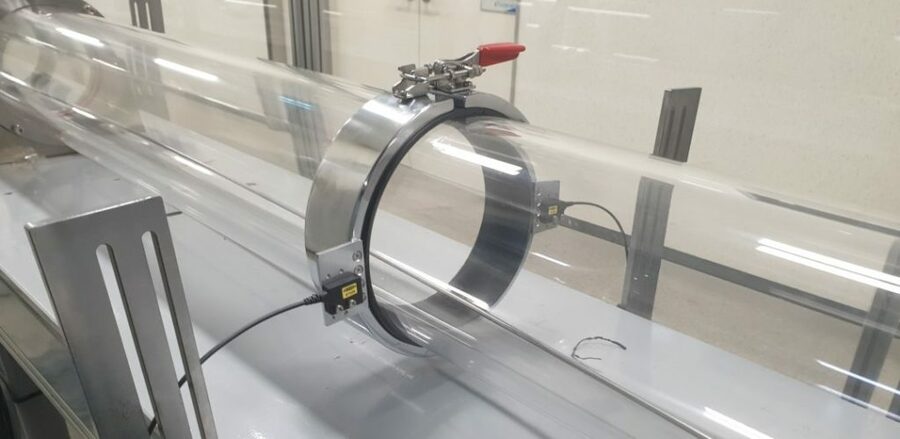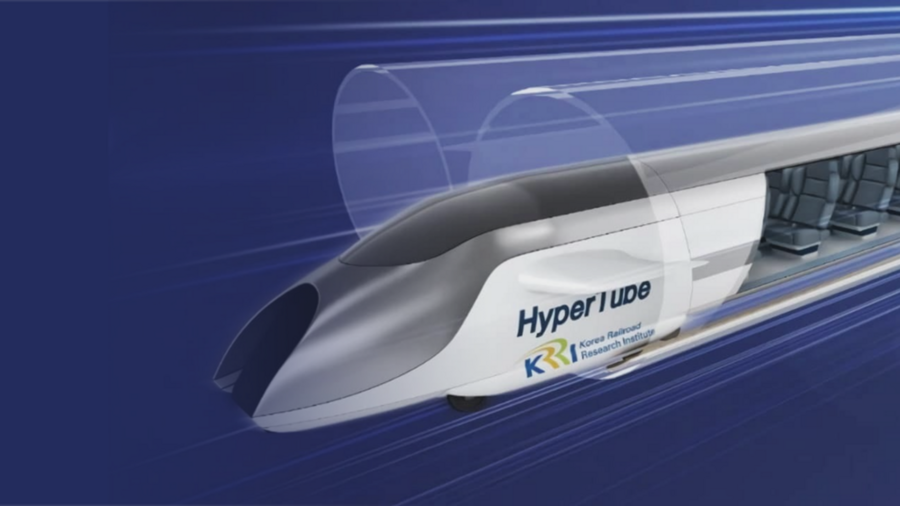The Korean Railroad Research Institute (KORAIL) recently announced that its Hyper Tube Express (HTX) train achieved a speed of over 1,000 km/h (621 mph) during a test, marking a significant achievement in the race to create the world’s fastest train system. The HTX is an ultra-fast transit system that moves trains at near-supersonic speeds by leveraging the magnetic levitation principle inside a tube under partial vacuum – a concept similar to Elon Musk’s Hyperloop design. To test their concept, KORAIL developed a 1:17 scale test model.
Key to the propulsion technology is an electric air compressor fan on the front of the Hyper Tube Express, which will transfer high air pressure from the train’s front to its rear and sides. The fan reduces friction in front of the train, helping propel it and create an air cushion around it to reduce the air friction and the air resistance when the train moves through the vacuum tube. During the scaled model testing, pressure, temperature, and velocity data are gathered for air resistance analysis and the air compressor’s design optimization. Also, vibration data is acquired to study the train’s stability and proper acceleration moving at super high speed.
The scaled test track has a total length of 60 meters and is divided into three sections for accelerating, cruising, and braking. KORAIL distributed a Gantner Instruments Q.bloxx data acquisition (DAQ) system along the vacuum tube to collect, process, visualize and save measurement data. The main criteria for selecting the Q.bloxx system was the powerful combination of distributed, mixed-signal data acquisition and precise time synchronization between DAQ modules.
Accurate velocity measurement is paramount to the success of the test. The maximum speed is measured in the acrylic tube’s cruising section, where the scale model travels a length of 20 meters. The cruise speed is calculated using several fiber optic sensors mounted at precisely measured intervals along the vacuum tube. Each fiber optic sensor provides a +24 V pulse with a response time of 10 µs when the model train passes it and is directly connected to the digital inputs available on the Q.station controller. The velocity is calculated in real-time on the Q.station controller by taking the distance traveled over the change in time.


The HTX scale model reached a record-breaking speed of 1,019 km/h (633 mph) at 0.001 atm during testing. The institute plans to refine its technology further before initiating demonstration research for actual track and vehicle development in 2022. KORAIL’s ambition is to deploy a full-scale Hyper Tube Express network by 2024, cutting the journey time between Seoul and Busan from 3.5 hours to around 30 minutes.
Sales Partner:
DAQ modules used for this project:
- Q.station 101 DT
- Q.bloxx A101
- Q.bloxx A108
- Q.bloxx D101
- GI.bench Data Acquisition Software
More articles
Trapped in Ice
Arctic ice is disappearing — the question is how fast. Summer sea ice could endure 100 more years, or it could vanish later this decade, with disastrous consequences for the rest of the planet. To nail down the answer, an expedition to the top of the world has to uncover the complex physics of ice.
Read more...Overcoming Challenges in Building Safe and Efficient Test Benches with test.con
Addressing Critical Obstacles in Test Bench Development
Developing test benches that comply with stringent safety standards and regulatory requirements is unavoidable in industries like automotive, energy, and medical technology. However, this process presents unique challenges, including navigating complex compliance landscapes, integrating diverse systems, managing operational risks, and ensuring thorough documentation. Below, we examine these challenges and demonstrate how Gantner Instruments' test.con software can effectively address them.
How strong are you? 💪🏼
Such was the question asked by electronics apprentice Fabio Rudigier when determining a suitable topic for his final project as part of his final apprenticeship examination. He wanted to develop a machine that measures the force applied by an arm press and displays it visually on a display device.
Read more...International Trade Fair for Electronics Development and Production
Your path to electronic excellence begins at Productronica India 2023. With Gantner Instruments at your side, you are well-equipped to seize opportunities and conquer challenges in the electronic industry. We look forward to meeting you at Productronica India 2023!
Read more...